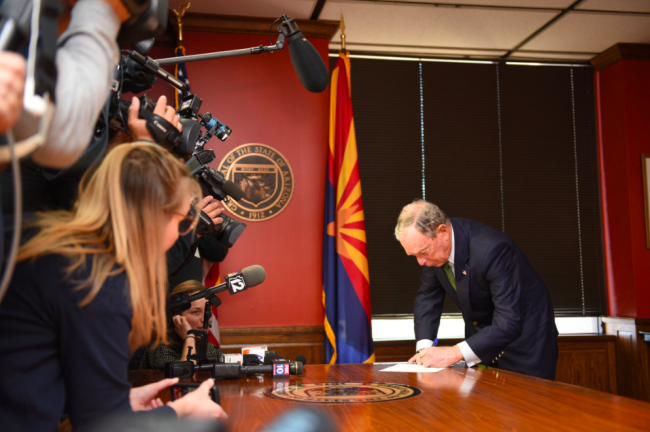Bloomberg's Unforced Error
The former mayor is catching heat for his plan to limit the coverage of his presidential campaign by the journalists who work for him


Not long after billionaire and former mayor Michael Bloomberg entered the White House sweepstakes, Bloomberg News’s top editor, John Micklethwait, made a stunning announcement. He declared that the news entity, a unit of the parent Bloomberg company, would cover his boss’s campaign, including policies, polls and other day-to-day aspects, but it would not scrutinize Bloomberg himself and would keep its hands off his charitable work, business practices and family.
This proclamation, which flies in the face of traditional journalistic practice for covering a politician, never mind a candidate for president, prompted a swift and highly critical outcry from the journalism establishment.
Many journalists questioned whether Bloomberg’s reporters and editors could remain objective. Some were furious about the policy and saw the 77-year-old candidate’s footprints. There is no question that Bloomberg is in charge of the company that bears his name. He is the largest shareholder in the media and financial-information behemoth.
Ignoring the Rules of Democracy
Washington Post media critic Margaret Sullivan wrote: “It’s the news-side issues that raise the most vexing ethical questions. Built into good journalism is independence.”
As Sullivan observed: “We already have a rich-guy president who thinks the tried-and-true rules that underpin our democracy aren’t made for him and who doesn’t exhibit a core understanding of the accountability role of an independent press."
Covering every aspect of a presidential candidate’s life is by now standard operating procedure. Gary Hart had a messy private life, which sank his campaign. Howard Dean’s shout of “Yeah!” proved highly damaging. Bill Clinton’s complicated personal world caused him and his campaign tsuris.
Who knows what diligent investigative reporters might uncover about Michael Bloomberg, who has led a remarkable life. His accomplishments include Harvard Business School, stardom as a Wall Street trader, huge success as the founder of the Bloomberg media empire and his reign as mayor of New York. He now has a net worth of an estimated $53 billion.
In recent years, he has won wide support and admiration because of his public and financial commitment to such causes as gun control.
Making it Tough
For now, Bloomberg is making it tough for his journalists to remain objective.
“It will be an enormous challenge – much bigger than when he was mayor,” noted Keith Kelly, the media columnist for The New York Post. “I think the only way for it to work is for Mike Bloomberg to step away entirely, which would mean either a sale -- which is highly unlikely -- or a complete blind trust with an outsider running his company.”
The controversy deepened when Bloomberg plucked Tim O’Brien, who was leading Bloomberg Views, the opinion section of Bloomberg News, to join the campaign as a senior advisor. O’Brien, who has written a major book about Trump is an understandable choice.
Still, some suggested that the O’Brien addition further blurred the line between Bloomberg’s fledgling presidential campaign and his company. Bloomberg created Bloomberg News in 1990 as a way to make the flagship Bloomberg Terminal, a Wall Street staple, more appealing to the company’s current and future customers.
Full disclosure: I worked for Bloomberg News in New York, covering Wall Street, from 1993 to 1999. I enjoyed working for the man (most of the time). He was an accessible boss and seemed to enjoy the give and take that came with interacting with his staff. For the most part, he stayed out of the newsroom and didn’t publicly try to influence any story that I ever wrote for him.
Bloomberg is interested in one thing: success. He will do (legally) whatever it takes to achieve his goals. The collateral damage he has caused in this nascent campaign probably won’t cause him to lose any sleep. He may see his controversial practice of limiting the efforts of his staff as something he has to do.
But he may well be dogged by the decision throughout his underdog campaign, however long it lasts, and beyond.